
Azad Jammu and Kashmir, officially the State of Azad Jammu and Kashmir and colloquially referred to as simply Azad Kashmir, is a region administered by Pakistan as a nominally self-governing entity and constituting the western portion of the larger Kashmir region, which has been the subject of a dispute between India and Pakistan since 1947. Azad Kashmir also shares borders with the Pakistani provinces of Punjab and Khyber Pakhtunkhwa to the south and west, respectively. On its eastern side, Azad Kashmir is separated from the Indian union territory of Jammu and Kashmir by the Line of Control (LoC), which serves as the de facto border between the Indian and Pakistani-controlled parts of Kashmir. Geographically, it covers a total area of 13,297 km2 (5,134 sq mi) and has a total population of 4,045,366 as per the 2017 national census.

The Indo-Pakistani war of 1947–1948, also known as the first Kashmir war, was a war fought between India and Pakistan over the princely state of Jammu and Kashmir from 1947 to 1948. It was the first of four Indo-Pakistani wars between the two newly independent nations. Pakistan precipitated the war a few weeks after its independence by launching tribal lashkar (militias) from Waziristan, in an effort to capture Kashmir and to preempt the possibility of its ruler joining India.
Pallandri, also spelled Palandri, originally Pulandari, is a Tehsil which serves as the administrative capital of Sudhanoti district of Azad Kashmir. It is located at latitude 33° 42′ 54″ N, longitude 73° 41′ 9″ E, 90 km (56 mi) from Islamabad, the capital of Pakistan. It is connected with Rawalpindi and Islamabad through Azad Pattan road. The main tribe of Pallandri is the Sudhan tribe. Here in Palindri the first Government of Sidhnuti Azad Kashmir on October 4,1947 was established
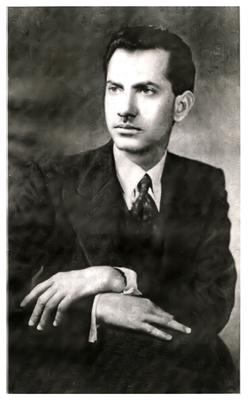
Sardar Muhammad Ibrahim Khan was a Kashmiri revolutionary leader and politician, who led the 1947 Poonch Rebellion against absolute rule of the Maharaja in the state of Jammu and Kashmir and played a key role in the First Kashmir War, supporting Pakistan. He served as the President of Azad Kashmir for 13 years across four non-consecutive terms and still remains the longest-serving president of the state, since its establishment.
Sudhan are one of the major tribes from the Poonch Division in Azad Kashmir with their population centered around Sudhanoti, Poonch District, Bagh, alongside a smaller population in the northern areas of the neighboring Kotli.

Poonch, is a town and the administrative headquarters of the Poonch district, of the Indian-administered union territory of Jammu and Kashmir, which is part of the larger disputed territory of Kashmir. It is located near the Line of Control – the de facto border in the disputed region. Poonch shares a de facto border with the Poonch district of the Pakistan-administered, self-governing territory of Azad Kashmir.
Sitara-e-Jurat is the third highest military award of Pakistan. It was established in 1957 after Pakistan became a republic; however, it was instituted retrospectively back to 1947. It is awarded for gallantry or distinguished service in combat; and can be bestowed upon officers, junior commissioned officers, petty officers, warrant officers, soldiers, sailors, airmen, and equivalents in the Pakistan Army, Navy, Air Force, and various paramilitary forces under federal control, such as the Frontier Corps, the Frontier Constabulary, and the Pakistan Rangers. It may be considered to be roughly equivalent to the Military Cross and the Silver Star.
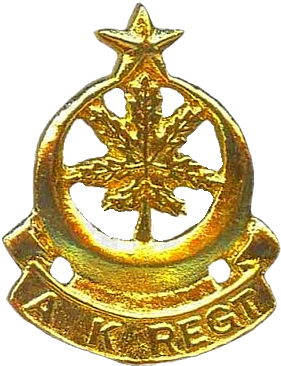
The Azad Kashmir Regiment is one of six infantry regiments in the Pakistan Army named after Azad Kashmir. It holds the distinction of being the only Battle Born Regiment in South Asia, formed by locals of Azad Kashmir to fight against Dogra Raj and it is the first regiment raised after Pakistan's independence. With the Regimental Centre at Mansar Mansar Camp in Attock District, the Regiment has gallantly participated in all Operations and Wars fought by the Pakistan Army

The All Jammu and Kashmir Muslim Conference (Urdu: آل جموں و کشمیر مسلم کانفرنس) also shortly referred as Muslim Conference (MC) is a political party in Pakistan administered territory of Azad Jammu and Kashmir.
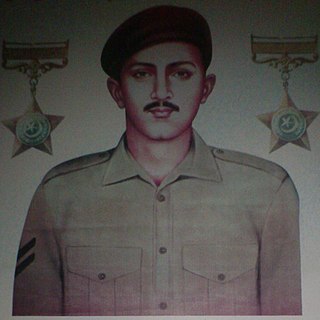
Naik Saif Ali Janjua was a Pakistani non-commissioned officer in the Azad Kashmir Regiment. He is known for being the second recipient of Pakistan's highest military award, the Nishan-e-Haider, which he was awarded posthumously for his actions of valor and gallantry during the Indo-Pakistani War of 1947-1948. He was also the only recipient of the Hilal-e-Kashmir award which was later declared as the equivalent of the Nishan-e-Haider.

Colonel Khan Muhammad Khan was a prominent Sudhan soldier and politician in Poonch, serving in the Legislative Assembly of the princely state of Jammu & Kashmir until 1947. Later he served as the Chairman of the War Council during the 1947 Poonch Rebellion.

The Haveli District is a district of Pakistan-administered Azad Kashmir in the disputed Kashmir region. It is one of the 10 districts of the Pakistan-administered territory of Azad Kashmir. It was previously a tehsil of the Bagh District but was promoted to the district status on 1 July 2009.

Military operations took place in Poonch district, then part of the princely state of Jammu and Kashmir, in 1948 during the conflict in Jammu and Kashmir between the Indian Army and Pakistani and Azad Kashmir rebel forces. Poonch withstood a siege by these forces from November 1947 until relieved by an Indian offensive, Operation Easy on 20 November 1948. The besieged garrison, commanded by Brig. Pritam Singh, was maintained by air supply. Military operations ended with Poonch town and the eastern part of Poonch district in Indian hands and western part of the Poonch district in Pakistani hands.

Colonel Sher Ahmed Khan, was one of the guerrilla commanders of the Azad Kashmir Movement and also served as the President of Azad Kashmir. He was known as Sher-e-Jang and awarded the Fakhr-i-Kashmir, which is equivalent to Hilal-i-Jurat.
Mirza Hassan Khan , of Majini Mohallah Gilgit, was a captain of the 6th Infantry of the Jammu and Kashmir State Forces. Placed at Bunji in the Gilgit wazarat, Khan rebelled against the Maharaja's regime after his accession to India and participated in the overthrow of the governor of Gilgit in November 1947. He later fought in the First Kashmir War as part of Gilgit rebel forces under the command of Colonel Aslam Khan and rose to become a colonel in the Pakistan Army. After leaving the army, he founded the Gilgit League to protest against the Pakistan's ad-hoc administration of Gilgit-Baltistan.

Malik Munawar Khan Awan was a Major rank officer in the Pakistan Army, whose career had begun in the British Indian Army and included spells in the Imperial Japanese Army and the revolutionary Indian National Army that fought against the Allies in World War II where he commanded 2nd INA Guerrilla Battalion during famous Battle of Imphal. He received a gallantry award for his work during Operation Gibraltar in 1965.
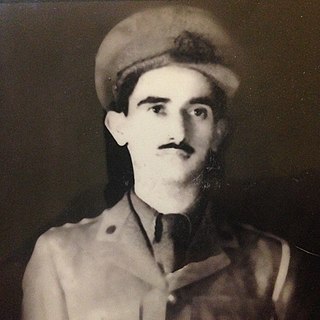
Khan Muhammad Khan commonly known as Khan of Mong, was a Captain in the British Indian Army during the World War II. After demobilisation, he served as a rebel leader during the First Kashmir War. He is credited with the capture of Mirpur, He was also allegedly involved with the Rawalpindi Conspiracy and the Poonch Uprising.
The Azad Kashmir Regular Force (AKRF), formerly known as the Kashmir Liberation Forces(KLF), were the irregular forces of Azad Kashmir until 1948. They then were taken over by the government of Pakistan and converted into a regular force. In this form, the unit became part of the country's paramilitary forces, operating out of the nominally self-governing territory of Azad Jammu and Kashmir. The AKRF was altered from a functioning paramilitary force and merged into the Pakistan Army as an infantry regiment following the Indo-Pakistani War of 1971.
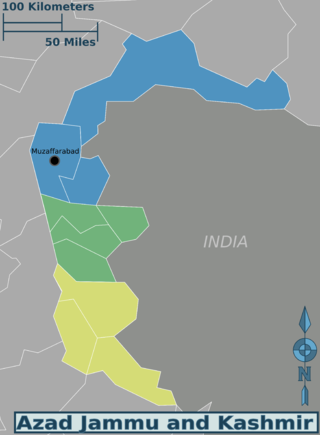
In spring 1947, an uprising against the Maharaja Hari Singh of Jammu and Kashmir broke out in the Poonch jagir, an area bordering the Rawalpindi district of West Punjab and the Hazara district of the North-West Frontier Province in the future Pakistan. It was driven by grievances such as high taxes, the Maharaja's neglect of World War veterans, and above all, Muslim nationalism with a desire to join Pakistan. The leader of the rebellion, Sardar Muhammad Ibrahim Khan, escaped to Lahore by the end of August 1947 and persuaded the Pakistani authorities to back the rebellion. In addition to the backing, Prime Minister Liaquat Ali Khan authorised an invasion of the state, by the ex-Indian National Army personnel in the south and a force led by Major Khurshid Anwar in the north. These invasions eventually led to the First Kashmir War fought between India and Pakistan, and the formation of Azad Kashmir provisional government. The Poonch jagir has since been divided across Azad Kashmir, administered by Pakistan and the state of Jammu and Kashmir, administered by India.

The Battle of Rawalakot, was a battle fought by the Azad Kashmir Regular Force against the State of Jammu and Kashmir which took place in the city of Rawalakot and surrounding areas between November 4–14, 1947 during the First Kashmir War, which was initiated by Muslim Sudhan ex-servicemen to fight for the accession of Jammu and Kashmir to the Dominion of Pakistan. On 15 June, Sardar Ibrahim Khan addressed a meeting in Rawalakot attended by 20,000 people, and gave a speech in "most 'seditious' terms". He told his audience that Pakistan, a Muslim state, was coming into being and the people of Jammu and Kashmir could not remain unaffected. After that day, he says, "a strange atmosphere took the place of the usually peaceful life in these parts". On 22 June, Chaudhary Hamidullah, the acting president of the Muslim Conference, visited Rawalakot and initiated secret plans to organize the ex-servicemen of the district for an eventual confrontation with the Jammu and Kashmir State Forces.
















